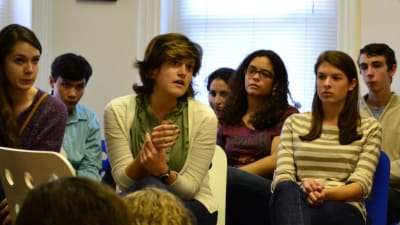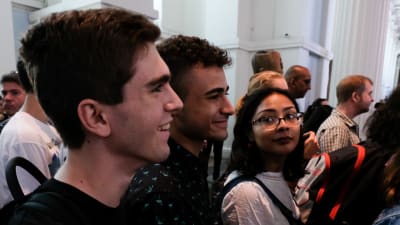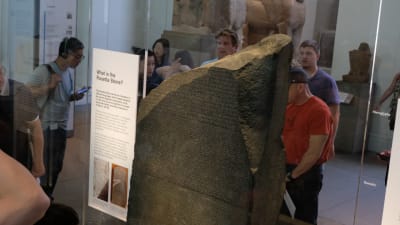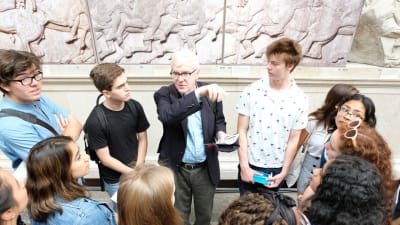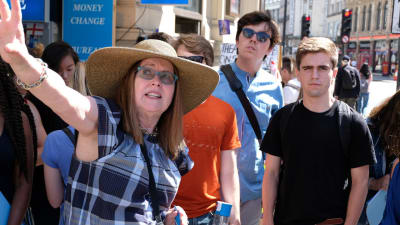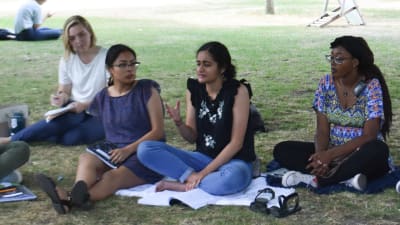Ethical Decision-making, Empires, and Intractable Conflicts: SEGL Summer Institute, Week 1
Week One of SEGL’s inaugural London Summer Institute zoomed by faster than the English made it into the knock-out round of the World Cup!
Like all SEGL students, our Summer Institute participants began their first week of classes with several introductory activities and lectures. These opening academic experiences present a foundation on ethics and philosophical history that our students can build upon as they experience our case studies and guest speakers. And, like all SEGL students, this semester began with a simulation of Hobbes’ State of Nature (the Infamous Skittles Scenario), and an introduction to Ethical Decision Making featuring Aristotle, Immanuel Kant, and John Stuart Mill.
The Skittles Scenario is an SEGL tradition. If you happened upon our flats in Maida Vale that Tuesday morning, you’d find students scurrying after plastic bags of candy and cackling with delight or dismay at 3×5 “chance” cards, all the while engaging with tricky ethical questions. What would you do if you found yourself in a situation in which there were no rules and limited resources? Would you lie about your resources, or help a friend who had fewer? Join a makeshift band of marauders, or choose to go it alone, trying to be as inconspicuous as possible? Build a “graveyard,” as our Summer 2018 students did, to memorialize those who couldn’t gather enough resources to survive? The conversation that followed was hilarious, reflective, and offered a glimpse into the hardworking minds of these students.
We then introduced the students to classic Western ethical theory–Aristotle, Kant, and John Stuart Mill. The students managed to turn a 20-minute lecture into a hour-long affair with their penetrating questions and synthesizing of the course material with their lived experiences. Later that day, we turned toward applying these theories to real-world dilemmas, discussing “The Singer Solution to World Poverty” by Peter Singer, and “Lifeboat Ethics: the Case against Helping the Poor” by Garrett Hardin. The students were assigned these readings before the semester began, and the conversation was so intellectually heated that our two hour session was over before we knew it.
Later that day, we took the students to Hyde Park, a classic London escape. Founded by Henry VII, it’s the largest of the Royal Parks and is famous for hosting both protests and concerts. There, we played one last game before heading home on the Underground.
The next day, we embarked upon two case studies: British Imperialism and have the Israeli/Palestinian Conflict. (Given speaker schedules and our five-week time window, we often ask summer students to juggle two or three case studies simultaneously!)
The British Imperialism case study gives students an introduction to both the United Kingdom’s famous (and infamous) history, and to engage them in some of the ethical questions that arise from it. For example: Are empires always good, or always bad, or does it depend? Does creating an empire require special responsibilities? Are some cultures “better” than others? What are the second and third-order consequences of actions from long ago? With these questions (and many more) in mind, we introduced our students to James Warren, a founding SEGL teacher raised in England (James was graduated from Cambridge before moving to the U.S. to attend Harvard Law School). Over an hour, and using three maps–one depicting the Empire at its peak, just before WWI, one depicting the Empire now, and one highlighting the Commonwealth countries–James took the students through the political, economic, and social implications of the Empire, peppering his lecture with Britishisms and parts of his own personal history as someone who grew up in the UK.
And then we began to examine one of British Empire’s key legacies: the Israeli-Palestinian Conflict. Though Britain is hardly the only entity responsible for the conflict, we reminded students of the Balfour Declaration, the promises of T.E. Lawrence, the British Mandate of Palestine, and other key choices that contributed to the current tensions. Navigating through the mine fields of loaded language and divergent narratives, we attempted to pin down key events and the various interpretations others have offered about them. The morning was marked by excellent questions, complex answers, and especially engaged students.
Later that afternoon, as part of the Israeli-Palestinian case study, we hosted former top Palestinian negotiator Dr. Ahmad Khalidi. Dr. Khalidi served as advisor to the Palestinian delegation at the Madrid/Washington peace talks in 1991-1993 and as senior advisor on security to the Cairo-Taba PLO-Israeli talks in 1993. He also served as a senior advsior to Palestinian Presidents Yasser Arafat and Mahmoud Abbas. Students were well-prepared to ask him about the particulars of the conflict and the prospects for peace. Speaking as a Palestinian, but also as someone who is keenly aware of the fragile nature of diplomacy and of the complexity of the situation, he pushed the students to consider the conflict from all sides, and to use empathy when considering how they might craft a solution.
The next day, we traveled to the beautiful Regents Park to meet with Dr. Alan Coffee, who teaches Global Ethics and Human Values at Kings College London. Coffee returned us to our first case study on the British Empire, providing an interactive lecture on the ethics of civil society, the nature of power, and the roots of today’s political discord. Drawing inspiration from suffragettes and Frederick Douglass, he provoked a classic SEGL conversation: a wide-ranging and collegial repartee, utilizing students’ knowledge of ethical decision making and their familiarity with today’s often-contentious political climate, challenging them at every step. At the end (some 90 minutes after he’d planned on departing), he remarked that he had challenged them with “Masters-level work” and was deeply impressed with their response.
On Friday, we boarded the Underground to make our way to the British Museum. The Museum is one of the largest, oldest (founded in 1753), and most comprehensive encyclopedic museums in the world; it is also at the center of the repatriation debate. In this context, repatriation is the return of cultural artifacts, sometimes looted during the process of empire, sometimes obtained through unsavory or unclear means, to their country of origin. After an introduction to that topic under the Elgin Marbles (seen by many as the central cultural artifact in this debate – more here). With instructions to consider the different sides of this debate, and directions toward the Australian and Indian artifacts, they were off to explore the museum on their own.
And with that, our first week in the SEGL Summer Institute came to a close. Next up–a visit to Parliament, more guest speakers for our Israeli-Palestinian Conflict case study (we’ll hear the Israeli and the British perspectives), and an introduction to London’s urban design.





